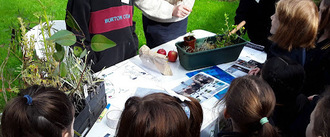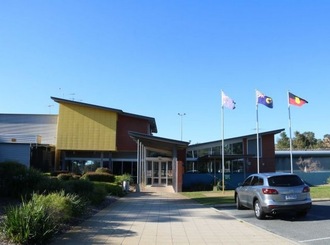-
Make Banyule an ICAN CityThe UN Treaty on the Prohibition of Nuclear Weapons - adopted by 122 nations in 2017 and entered into force in 2021 offers a powerful alternative to a world in which threats of mass destruction are allowed to prevail. Weapons that have been outlawed by international treaties are increasingly seen as illegitimate, losing their political status. Three out of four people want the Australian Government to sign and ratify the UN Treaty on the Prohibition of Nuclear Weapons, but it hasn’t happened yet. Local councils directly represent communities and ordinary people. As with the Climate crisis, Councils have a powerful role to play in driving important change.113 of 200 SignaturesCreated by Don Stokes
-
Voting Rights for Permanent ResidentsImagine living, working, and otherwise contributing to a community where you have no power. Imagine feeling like your voice is never heard in your own home. Imagine being denied the right to vote… in 2022. That is the reality of being a permanent resident in so-called Australia, in this so-called democracy. Estimates suggest that there are 2 million Permanent Residents in Australia*. That's a hefty percentage of our population! For many, getting to this point has been a battle hard-fought. Tears, sacrifices and a significant financial impact are all worth it for many of us, for that sense of security (a sense denied to many of us who were still on temporary visas through the pandemic). Many of us have jobs, and pay taxes. Taxes we don’t get any say in how they are spent. We work in health, education, government, for non-profits - just like Australians. Some of us work those jobs no Australians will do, perhaps on the farms. Some of us volunteer, or get involved with our local community in other ways. We may be students, bettering ourselves for the sake of this country. Others still raise Australian children, our future generation. Some do it all, while some are just figuring it out right now. But even those who do “nothing” contribute to our economy, and more importantly, our society. No matter the level of these contributions, we should all count. Politics literally touch every tiny bit of our lives, every day. The rights we have at work, the protections we have as women, children, or people living with a disability, as well as our ability to access the healthcare and welfare systems. The list goes on. So, why don’t we just become citizens? It is not that easy. Not only is it a time-consuming process, you have to meet a lot of extra requirements. Plus - you guessed it - you have to pay more money (the costs just doubled last year). The wait lists are also pretty ridiculous… and the applications are not processed in order, despite claims to the contrary. Finally, many countries don’t even allow you to have dual citizenship! We are not asking for special treatment. I cannot possibly speak for everybody, but most of us are so grateful to be here. On a personal level, I believe the right to vote is so important. Women died for the right. In all patriarchal and/or white supremacist and/or classist societies, denying a marginalised group the right to vote has always been commonplace. Disgracefully, First Nations people were only given such a right (on stolen land) in 1962. This seems unthinkable now. While I cannot begin to imagine such oppression, surely this is shocking as well? The etymology of the word "democracy" roughly means "the will of the people". ALL people. Did you know? Other countries allow all residents to vote, providing they have shown at least some commitment. The commitment we have shown, I promise you, goes above and beyond. I have been here for almost 6 years, dedicating myself to this country and its people. I am far from the only one. I will pursue this campaign even after I proudly accept my citizenship, hopefully later this year. I love my Australian partner, my Australian friends, all of my opportunities. Chances are, you know someone like me - maybe you were someone like me - please let us be heard! Personally, I think we should allow anyone living here long-term the right (including prisoners), but let’s start with PR. This is our home, our FOREVER home, and we care about it - so we want the chance to make it better. *It is strangely difficult to find the exact numbers of Permanent Residents living in Australia. For the year ending 30 June 2020, there were over 7.6 million migrants living in Australia. 29.8% of Australia's population were born overseas. According to the most recent data from 2016, only 82% of respondents were citizens on Census night. In my city, Sydney, that figure dropped to 64%. Allowing for many temporary visa holders and even tourists, this still leaves a large amount of Permanent Residents unaccounted for. (Please note, 2021 data has not yet been published)13 of 100 SignaturesCreated by Claire Louise Sheridan
-
Renewables not Gas for East GippslandGas is a dangerous, polluting fossil fuel. It releases greenhouse gasses that contribute to the horrific bushfires and raging floods we’ve seen devastate communities across the country in recent years. And it isn’t just a disaster for our climate. It’s also bad for our health. Public health experts are concerned about the health risks of cooking with gas in our homes, which can have a similar impact on childhood asthma as living with cigarette smoke. And here in Victoria, we burn more gas per person than any other state. But the good news is that some local councils around the country are bowing to community pressure and taking matters into their own hands - promising to end new gas connections, and help people with the cost of switching to electricity and renewables. And with enough pressure from the community, our local council could join this movement today!3 of 100 SignaturesCreated by Shane Elmore
-
Safe Streets to School in CanberraChildren in the ACT deserve to safely walk or ride to school (or to public transport to get to school). Walking or riding to school improves children's fitness and independence. However, they are often driven over short distances to school because parents perceive that their child's journey to school is unsafe for part or the whole of the journey. As a result, our streets are subject to tens of thousands more car trips every year, making them even less safe and clogging up roads with unnecessary traffic during morning drop-off and afternoon pick-up. Streets without footpaths and crossings with speed limits higher than 30km/h are not considered safe under the Safe System approach used in Australia and the ACT. The Safe System approach is the basis for and at the heart of all ACT Government transport policy making and efforts to improve road safety and achieve Vision Zero for deaths and serious injuries on our roads. Why we need Safe Streets to School: - Research shows that children cannot judge gaps in traffic consistently when cars go faster than 30km/h to safely cross a street - On streets where there are no footpaths and crossings, reducing the car speed to 30km/h would prevent most accidents: the stopping distance for a car traveling 30km/h is 13m. Stopping distance for a car traveling 50km/h is 37m. The risk of death or serious injury if hit at 30km/h is less than 10%; compared to 90% if hit at 50km/h. It is an unreasonable risk to place our children in harms way on their journey to school. Safe Streets to School will help: - achieve each of the four goals of the ACT Road Safety Strategy 2020-2025 - make Canberra a healthy, active and inclusive city, including being Australia’s most walkable city - the ACT reach its legislated target of zero net greenhouse gas emissions by 2045, because it will help people if they feel safe enough to choose active travel and so reduce greenhouse gas emissions from transport. Our children deserve the right to walk to school (or public transport to get to school), so they can have a healthy and safe future. We do not believe it is fair to wait for an accident to happen and our children to get injured or killed before they can walk or ride safely. Please make our streets to school safe now.53 of 100 SignaturesCreated by Gillian King
-
URGENT Kabi dreaming site Djaki Kundu is being demolished NOW against First Nation Peoples' consent.Djaki Kundu (Rocky Ridge in English), also referred to as 'the Gympie Pyramid' is being destroyed as we speak, for a highway upgrade carried out by the Department of Transport and Main roads Queensland. Djaki Kundu is an ancient and sacred healing site, connected to the Seven Sisters dreaming song-lines and stories, and a place to commune with the Star Ancestors. Djaki Kundu is situated in Bunya Country near Gympie, in what is now called Queensland, Australia. Kabi Elders and guardians of the site have inherited a religious and spiritual Djakurpa tribal Law responsibility to protect the sacred site, which was built thousands of years ago by Kabi Ancestors. Kabi tribal Elders are distressed that Queensland government authorities are destroying the site and it's ancient sacred relics in order to upgrade a highway, despite the fact Australian Laws make it illegal to destroy 'Aboriginal cultural heritage' or 'Aboriginal relics'. Human rights abuse will not be tolerated of Kabi Country. Urgent action needs to be taken, COME TO GYMPIE and follow posts by Kabi dreaming on Facebook. https://www.facebook.com/Kabi.Dreaming/ SIGN PETITION and show your support by messaging Department of Transport and Main Roads QLD, QLD environment minister, governing authorities, offering legal assistance and sharing this breach of human rights in person and online.1,352 of 2,000 SignaturesCreated by Laura Eden
-
Education for Sustainability for AllForty years ago, the Australian Association for Environmental Education (AAEE) was formed to champion education reforms (Education for Sustainability is the latest term to describe that) focused on positively connecting students with nature, developing critical thinking and analytical skills and empowering them to help develop solutions to our human induced environmental problems. Now, we need an education revolution to save the planet. In Our campaign supports other international campaigns to develop grassroots support and on the ground efforts by students, educators, and civil society to demand national level commitments from Ministries of Education and Environment. Through this campaign, we will ensure that students in Australia and across the world benefit from high-quality education to develop into informed and engaged environmental stewards. AAEE believes that every school in the world must have compulsory, assessed climate and environmental education with a strong civic engagement component focused on achieving a sustainable society.295 of 300 SignaturesCreated by Stephen Fuller
-
Residents for Safe Streets to School: ShoalhavenThe kids of Shoalhaven deserve to walk or ride to school safely just like we did growing up in Australia. Walking to school improves kids' fitness and independence. However, they are often driven over short distances to school by parents. Parents perceive that their child's journey to school is unsafe on part of or on their whole journey. As a result, our streets are subject to tens of thousands more car trips every year, making them even less safe and clogging up roads with unnecessary traffic during morning drop off and afternoon pick up. Streets without footpaths and crossings with speed limits higher than 30km/h are not considered safe by Australia's safe system approach. The Case for crossings: Research shows that children cannot judge gaps in traffic consistently when cars go faster than 30km/h to safely cross a street On streets where there are no footpaths and crossings, reducing the car speed to 30km/h would prevent most accidents: the stopping distance for a car traveling 30km/h is 13m. Stopping distance for a car traveling 50km/h is 37m. The risk of death or serious injury if hit at 30km/h is less than 10%; compared to 90% if hit at 50km/h. It is an unreasonable risk to place our children in harms way on their journey to school.22 of 100 SignaturesCreated by Matthew Loft
-
Residents for Safe Streets to School: Adelaide HillsChildren deserve to walk or ride to school safely. Walking to school improves kids' fitness and independence. However, they are often driven over short distances to school by parents. Parents perceive that their child's journey to school is unsafe on part of or on their whole journey. As a result, our streets are subject to tens of thousands more car trips every year, making them even less safe and clogging up roads with unnecessary traffic during morning drop off and afternoon pick up. Streets without footpaths and crossings with speed limits higher than 30km/h are not considered safe by Australia's safe system approach. The Case for crossings: Research shows that children cannot judge gaps in traffic consistently when cars go faster than 30km/h to safely cross a street On streets where there are no footpaths and crossings, reducing the car speed to 30km/h would prevent most accidents: the stopping distance for a car traveling 30km/h is 13m. Stopping distance for a car traveling 50km/h is 37m. The risk of death or serious injury if hit at 30km/h is less than 10%; compared to 90% if hit at 50km/h. It is an unreasonable risk to place our children in harms way on their journey to school.21 of 100 SignaturesCreated by Skye Curlis
-
Free Robert PetherRobert Pether is an Australian citizen, husband and father, employed by Dubai-based company, CME Consulting. Robert was working on a project for the CME's client, the Central Bank of Iraq. The project was hit by delays and increased costs due to the COVID pandemic and a dispute arose whereby the Iraqi government demanded the return of $12 million USD paid to CME Consulting. Robert travelled to Iraq with his colleague, Egyptian Engineer Khalid Zhagoul, on behalf on CME Consulting and by invitation from the Central Bank of Iraq - to a meeting to discuss the resolution of the industrial dispute. When Robert and Khalid arrived in Iraq, there was no actual meeting. Instead they were arrested on 7 April and subjected to over 3 months of arbitrary detention before being sentenced to 5 years jail time and fined 12 million USD. The contract between CME Consulting and the client, the Central Bank of Iraq, was a FIDIC Contract (International Federation of Consulting Engineers) of which one of the fundamental principles is that employees hold no personal liability. Robert Pether and his colleague Khalid Zhagoul are employees who have been charged response to the Central Bank of Iraq's allegations against their employer, CME Consulting. Denied access to their laptops, official documents and with insufficient access to their lawyers, Robert Pether and Khalid Zhagoul were incapable of launching a sufficient defence at their trial. They now have until 24 September 2021 to launch an appeal, without sufficient access to representation and supporting documents. This is, essentially, a thinly veiled hostage situation where two employees have been imprisoned and fined the exact amount - 12 million USD - that was in dispute between their employer CME Consulting and the client, the Central Bank of Iraq. As they will not be released unless the fine is paid it is also, in all probability, a life sentence. Please sign this petition to put pressure on Prime Minister Scott Morrison and Senator Marise Payne, Minister for Foreign Affairs, to take action and intervene in this gross violation of human rights.1,206 of 2,000 SignaturesCreated by Clare Evans
-
Affordable housing through long term leasesHousing affordability in Australia has never been worse; even many people with fulltime employment are struggling to be able to find an affordable rental, let alone buy a place to call home! I believe that one of the biggest, and most ignored drivers of this lack of affordability is the short-term leases that are offered to residential tenants across Australia. My wife and I were fortunate enough, thanks to a very generous gift from a relative, to buy a house a few years ago, but we spent well over a decade on the rental rollercoaster. We were constantly offered 6month leases on properties, and lived in fear of being evicted at short notice through no fault of our own. We were at the mercy of our landlord, and a lease period barely long enough to settle in to a place before potentially being asked to move out! This lack of security was one of the main reasons we were desperate to buy a home; had we known we had stable residency for a number of years we wouldn't have felt the same pressure to leave the rental market. I know we're not alone in this; many of the friends I've spoken to feel exactly the same way, and if you're reading this I'm sure you can relate. Short-term residential leases drive up the cost of housing in 2 ways. Firstly, they allow landlords to frequently increase the rent on their property, not because their costs have increased, but simply because they can. Residents can either accept the increase, or deal with the cost and stress of relocating (moving house is recognised as one of the most stressful life experiences). This means that many tenants will simply have to shoulder the rent increase, and the knowledge that they are potentially faced with an ongoing series of future rent increases. And so the cost of rental housing goes up. Secondly, the insecurity around residential rental means that, like my wife and I, many people will feel that their only option to find stability and build a "home" is to buy one. This leads to an increase in buyers in the property market, who might otherwise have been quite happy to simply rent if they had security of tenure. An increase in demand (more buyers) in the property market inevitably drives purchase prices up. And so we have a double-whammy of housing inflation, all linked back to the same problem of lack of security in residential properties. When we look at places like Europe, many people do not own a home, and have no desire to, because they have residential leases that can be anything up to 99years in duration. They have security of tenure; whether they own the building or not, they have a sense of stability, and a place which is their "home". These countries do not have the hyper-inflation of the housing market which we see in Australia. In Australia we offer businesses long-term leases with the option to extend their tenure, and it allows the commercial property market to operate at a profit whilst allowing business tenants to have the necessary security to run their business. Surely we can extend the same practices to residential properties too?! Housing is a basic human right, and one we as Australians are doing a very poor job of providing. We have fallen into the trap of seeing a house as simply a way to make money, rather than a place for someone to live. It's time we made a change for the better, for everyone. Let's make it mandatory for long-term residential leases to be offered to all tenants!60 of 100 SignaturesCreated by Steven Hinchliffe
-
Mental Health Long Weekends during online schoolingI am sure so many children doing online school right now would agree a 3 day weekend would be good all year round but I think it is possible whilst doing online school. On the 2nd of August, there was the highest number of calls made to the lifeline support in 58 years of 3 345 calls. Especially through these rough times, people deserve a break and maybe even adults would need a 3 day weekend during these times too.72 of 100 SignaturesCreated by Chelsea Wright
-
Mental Health Unit for Banksia Hill Juvenile Detention CentreWhen you first come to the prison, you have nobody. If you have mental health issues, they send you to a locked cell with nothing and you just sit there 23 hours a day and only allowed out once a day. This is not good enough. Being in a cell trapped with mental health issues is not good, it causes bad thoughts and more trauma. They abuse people if they have mental health issues. They make a joke if you have mental health issues and deal with self harm. You feel lonely and abandoned. They restrain you and make you feel more traumatised. I would love if they have a mental health unit but you have officer there and mental health professionals. If you tell people stuff in there right now about your mental health, they lock you up in a small room with no social and sit there crying all day. We are treat like animals, we are made to eat our meals without plastic spoons or forks or anything. We are treated worse than dogs.26 of 100 SignaturesCreated by S Thompson







.png)
.png)



